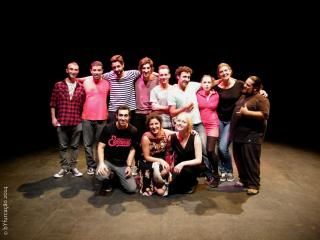Back in Portugal: on support in improv
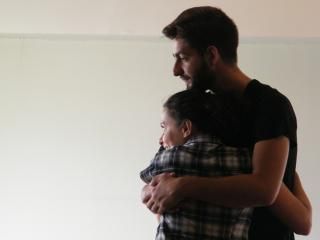
“If we treat each other as if we are geniuses, poets and artists, we have a better chance of becoming that on stage.” Del Close
So I was back in Portugal again to teach longform improv. And I found myself emphasizing this concept quite regularly: treating your scene partners as if they are brilliant. Because basically that is all you need when you are doing that uncertain, scary thing that we call improvising.
It was Paulo and his group bYfurcação that invited me to the beautiful town Sintra, not far from Lisbon. In 2 days we worked with a group of 10 improvisers on longform improv.
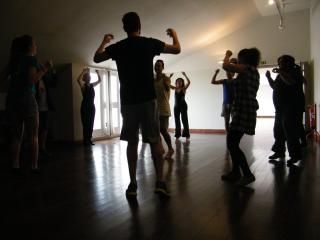
It was a different kind of group that I normally work with: some were professional actors, some had no improv experience whatsoever, and some were both. And another thing new to me: the large representation of men in the group. I gather it has to do with the South European culture. It felt good to be a female trainer in a male dominant improv community.
Another cultural difference I came across was how well they are connected to their bodies and their openness to show emotion. These players danced incredibly easy and smooth, and were not afraid to be emotionally touched while being on stage. I loved that, I feel lucky just to watch.

In 2 days we worked on basic longform skills like platform, listening, inspiring your partner, storylines, edits and acting without words. We played a couple of longforms and decided that we were going to perform a variation of the Armando Diaz on stage.
I have a couple of favorite moments from that show. It started with me encouraging the more experienced players to take care of the unexperienced. “Bring them with you, let them go first or give them a small push when you see they need that”. It was a big stage; the threshold was high to step in.
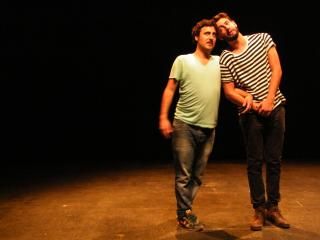
Ten minutes after the show started. I saw that the guy next to me had not gone up yet for a scene. So I patted his back a little to encourage him to go. He turned to me and said: “I am really afraid. I do not think I can do this.” I told him I really believed he could and then he stepped into the spotlight for a monologue that was shaky, stammering but so truthful.
He later went back for yet an other monologue and I couldn’t have been more proud. Later one of the girls came up to me to tell me: “Thank you so much for pushing me. I needed that and I am so happy I got to play because of that.”
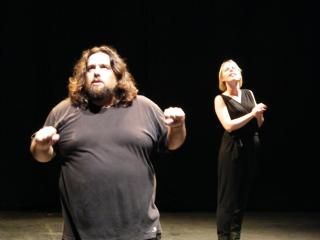
But support apparently goes both ways. The show was performed in English and Portuguese (and I slipped in a bit of Dutch as well). Without me asking for it, the players started to whisper the translation of the Portuguese scenes for me. One of the players even ran backstage to get to my side where I was standing without someone to translate. A very attentive move.
These moments made me realize how much we can mean for each other as improvisers. To support is not just supporting in scenes: it is the push when you need it and offering support before it is asked. The Portuguese made me feel brilliant, and I think on that night we all were.
My thanks goes to bYfurcacao (Ana, Paulo, Daniela), Mariana & Andrew, Karitsis, Joana, Ana, José, Gonçalo, Ulisses, Hugo, Ricardo, MU.SA and Teatroesfera.
